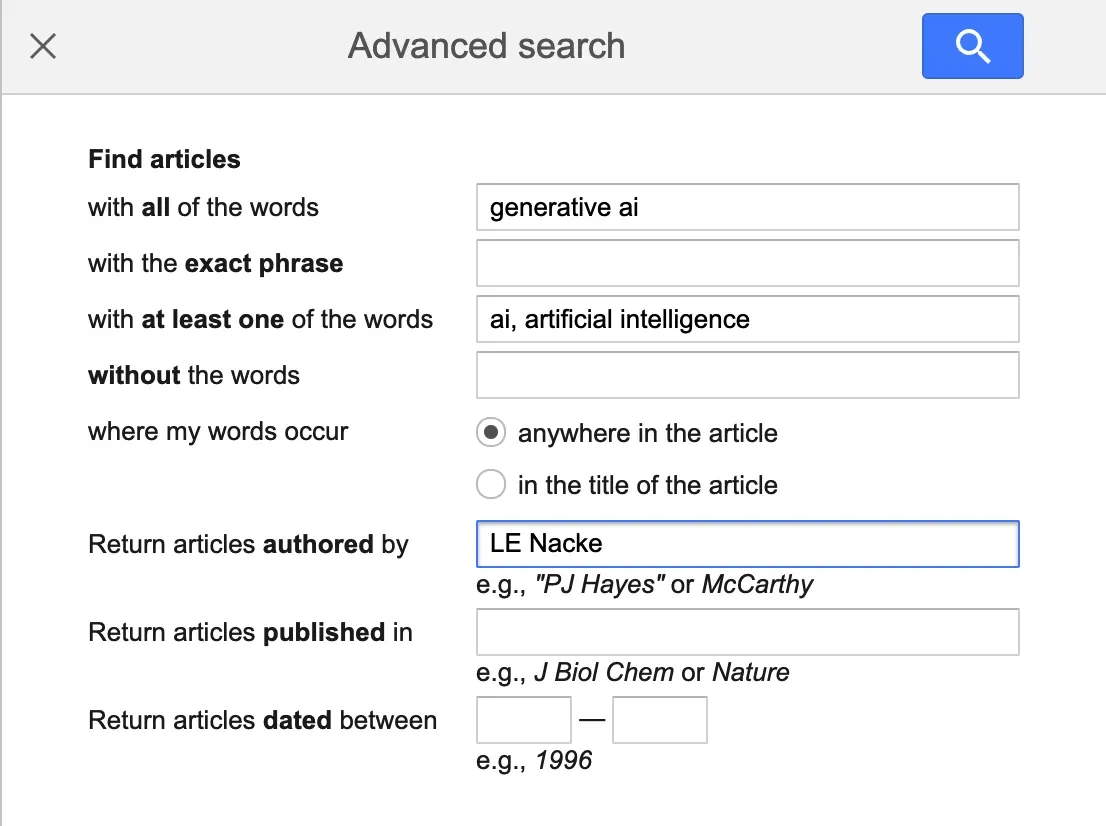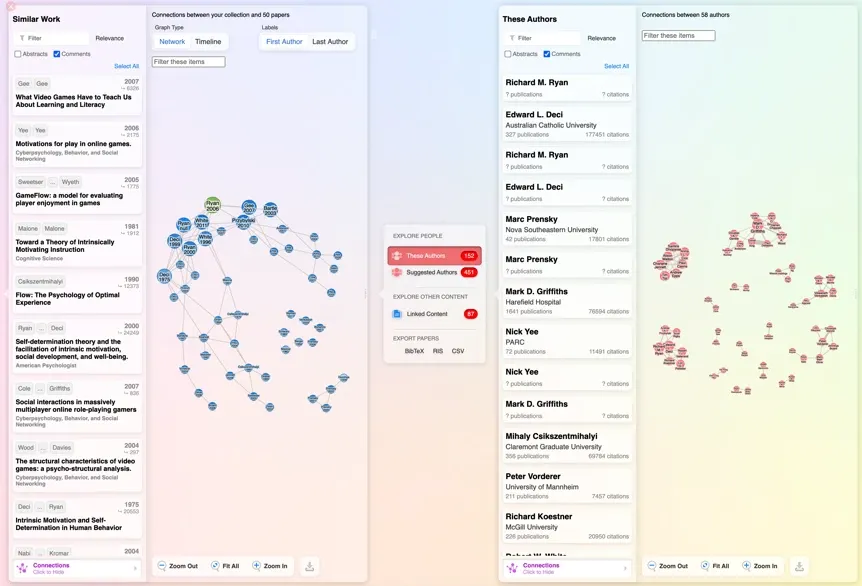Today's issue is sponsored by Litmaps (get 30% off Litmaps Pro until the end of the month, with code LENNART30): Want to get a crash-course in the most essential and cutting-edge tools & methods for research? I'm teaming up with them for an exciting 2-day FREE event, The Future Ready Scholar Conference. Learn how to produce high-quality research faster, while maintaining your academic integrity. Register here now! Bonus: you get to see my funky mug in a video livestream.
I'm also excited to invite you to an exclusive webinar hosted by my friend Ilya Shabanov at Effortless Academic. He has developed a fun, new method that fuses your academic notes with AI to create well-structured manuscripts. Use my link to get a 20% discount on the webinar.
Every researcher knows the feeling: staring at a blank document, wondering how to find those perfect papers that will shape their work. After years of wrestling with databases and drowning in PDFs, I've finally discovered the method for conducting efficient literature reviews. Here's what I teach my students:
Always use a multi-database strategy
Think of academic databases like specialty stores. Sure, you could get everything at Costco, but sometimes you need that artisanal cheese (Kaltbach cave or bust) or that specific spice market (Safran any day). The same goes for research papers.
Here's my tried-and-tested database search engine combination:
- Google Scholar. The OG academic search engine that catalogs academic articles from all fields (and also a bunch of non-peer reviewed junk that ‘looks’ academic). It serves as an excellent starting point though for research and includes a useful "Cited by" feature to track article citations.
- PubMed. Excellent for health and medical research, particularly mental health topics (e.g., generalized anxiety disorder). It finds papers that might be missed in tech-focused databases and uses Medical Subject Headings (MeSH) for precise searching.
- IEEE Xplore & ACM Digital Library. Essential for technology and VR research. These databases help you find papers on VR applications, game-based assessments, and technical methods. IEEE Xplore contains IEEE VR conference papers and related journals, while ACM includes major conferences like CHI (which is the major conference in my field) and VRST.
- Scopus or Web of Science. These comprehensive databases catalog a broad spectrum of journals and conferences. They offer both a broad overview of the field and powerful tools for filtering and analyzing citations. They are also expensive AF and if your university is not shelling out the money for them, you are sh*t out of luck.
Always search multiple databases for your topic. Because no single database contains everything, using different sources helps you find the most relevant literature. For example, combining searches from Google Scholar and IEEE Xplore gives you complementary results.
It's not what you search, it's how you search
After countless hours of trial and error, I've developed a search strategy that actually works. Here's the framework:
- Break your topic into is components and synonyms. Unpack your subject matter ("VR mental health assessment for GAD") into core concepts: virtual reality, mental health, assessment, generalized anxiety disorder. Then brainstorm synonyms and related terms (like immersive, serious games, anxiety measurement) to use in different search combinations.
- Master boolean search logic. Create effective search strings by combining keywords with
AND,OR, andNOT. For example:("virtual reality" OR VR) AND (anxiety OR "mental health") AND assessment. UsingANDnarrows your search by requiring all terms, whileORbroadens it by including synonyms. This approach guarantees that every result includes all your key concepts. - Use smart quotation marks strategically. Use quotation marks to find papers containing specific phrases. For example, search
"game-based mental health assessment"to find articles with that exact phrase. This filters out irrelevant results and focuses your search on precisely what you need. - Use tactical filters. Most databases offer powerful filtering options by publication year, study type, and subject area. For rapidly evolving fields, you may want to limit your search to the past 5–10 years to capture recent developments. You can usually polish up results by language or document type—such as review articles or conference papers.
Use advanced search parameters

In Google Scholar’s Advanced Search, you can specify words that must appear or exclude words. In PubMed, use field tags like [TI] for title or [MAJR] for major topic to refine results (e.g., anxiety[MAJR] AND virtual reality[TI]).
Create 2-3 focused search strings with different keyword combinations for best results in any search engine. For example, try searching for "VR exposure therapy for anxiety assessment" or "game-based assessment for GAD in VR". Then use these results to find the most influential and relevant papers.
Start a snowball fight to get deep into your literature
This is where it gets exciting. Finding one solid paper opens a gateway to dozens more. When you discover a strong paper in your area, just turn this into your starting point. Study its literature review and reference list to find papers it cites (backward snowballing). Then use tools like Google Scholar or Scopus to discover newer papers that cite your paper (forward snowballing). This “snowball” method reveals an entire chain of connected research.
- Backward snowballing: Check the paper's references to find foundations.
- Forward snowballing: Track citations to see who built on this paper.
The beauty of this method? It creates a natural chain of knowledge that helps you understand how ideas evolved over time. Litmaps, Research Rabbit, and Inciteful are apps that help you understand these citation chains visually.

Pick one highly relevant paper and start a citation chase: identify 2–3 papers from its references and 2–3 papers that cite it. Then repeat this process with your new findings. This method will rapidly build your collection of relevant literature.
Stay organized or cry me a river later
This might be the most important lesson I learned (the hard way). Here's my current system:
- Use reference management software. Tools like Zotero, Mendeley, Paperpile, Readcube Papers or EndNote are essential for keeping track of papers. Immediately save PDFs and citation info for each paper you find. Organize them into folders or with tags (e.g., “VR Therapy”, “Assessment Tools”, “GAD”). It just makes it easy to retrieve sources later and insert citations while you’re writing a paper.
- Create a literature matrix. Create a structured table (in Word, Excel, or Notion) to summarize each paper. Include essential columns: Author, Year, Title, Key findings, Methods, and Relevance/Gaps. Write a clear 2-3 sentence summary for each paper in your own words, and note any limitations or research gaps mentioned by the authors. Viewing your literature in an organized matrix makes it easy to compare studies and becomes indispensable when writing your literature review.
- Take smart notes. For each article, jot down key points: What problem does it address? What methodology? What were the results? Crucially, note how it relates to your research question (Does it support the need for your work? Does it leave an open question?). These detailed notes will save you from re-reading entire papers later, as you can quickly refresh your memory from your summary.
- Use tags, groups, and collections. As you read, you'll start recognizing natural groupings in your literature (e.g., studies on VR exposure therapy for anxiety, studies on game-based mental health assessments, theoretical papers on GAD symptoms in virtual environments). Sort your references into these categories in your reference manager (with tags or collections) or notes. This organization helps you structure your literature review by themes instead of presenting a simple list of studies.
- Implement a consistent naming scheme. When storing PDFs, use a consistent naming format (e.g.,
2021-Smith-VR-anxiety.pdfrather than arbitrary numbers). It’s a way for you to still locate papers by year and author even if your citation manager fails. But it’s less essential if you have cloud storage from your reference manager (and just keep all your PDFs in your reference manager).
Set up a Zotero library with collections for each theme of your research. For each valuable paper you decide to keep, immediately add it to Zotero with tags and a concise a one-paragraph summary in the notes field. This simple habit will save you countless hours later when writing the literature review chapter.
One final truth about literature reviews
After years of doing this, I've realized something crucial: A good literature review is about more than finding the right papers. It also pieces together a story of your research in your head. Each paper you find weaves together a larger puzzle, showing how your field evolved and where it might go next.
P.S.: Curious to explore how we can tackle your research struggles together? I've got three suggestions that could be a great fit: A seven-day email course that teaches you the basics of research methods. Or the recordings of our AI research tools webinar and PhD student fast track webinar.






